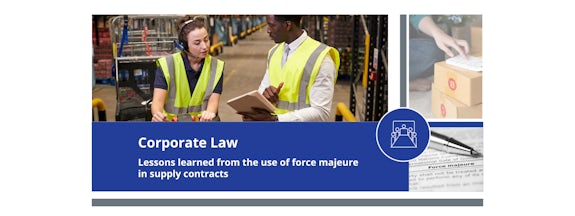Force majeure is a term that has been in the spotlight over the past years due to the COVID-19 pandemic and its impact on industry supply chains. At the height of the pandemic we saw factories closed across many countries for significant periods and supply chains reacting to capacity shocks whilst demand increased as we came out of lockdowns. All of this created complex challenges for businesses and their legal advisors. Here, we explore briefly some lessons we have learned from the use of force majeure in supply contracts.
Force majeure is a legal term that refers to unforeseeable circumstances which prevent a party from fulfilling a contractual obligation. In the context of supply contracts, force majeure can be invoked by either the supplier or the buyer when an unforeseeable event beyond their control renders performance of the contract or of a particular obligation impossible.
To rely on the relief available, the impacted party usually has to demonstrate that:
- The event or circumstance is caught by their contractual definition of force majeure – clauses must be drafted carefully and thought should be given to the breadth of definition used. Many clauses did not include “pandemic” in them prior to the instance of COVID-19.
- The event or circumstance was unforeseeable and beyond their control – e.g. pre-emptively closing a factory out of uncertainty but without being required to do so may not satisfy the “beyond their control” test. However, Government decisions to close factories under a lockdown order are far more likely to be caught.
- All means of performance are commercially impracticable – e.g. sending office workers home with laptops was a commercially practicable solution to keep business running. However, it was far more difficult to maintain or set-up alternate factory operations at the height of multi-national lockdowns.
- The relief sought is permitted by the clause – e.g. force majeure clauses provide relief from penalty for non-performance. However, they rarely if ever provide for compensation or remuneration, aside from the ability to agree appropriate extensions in contract or performance durations to account for the period of stoppage.
- Ongoing lack of performance continues to have a causal link in the ongoing force majeure event. e.g. once a government closure order is lifted, keeping the factory closed for longer out of concern for staff may seem wise from a safety perspective, but it is unlikely to attract ongoing force majeure protection.
In some circumstances prolonged force majeure may provide a mechanism for terminating a contract. If performance does not resume after a certain amount of time, either party may have the right to terminate the contract. Thought should be given to the required duration and ongoing nature of a force majeure event and the implications for both parties of termination.
In conclusion, force majeure can be a useful tool for managing risk in supply contracts. However, it should be used carefully and only when all other means of performance have been exhausted. Parties should carefully evaluate the circumstances and conditions giving rise to and responding to a force majeure event with respect to their supply contracts.
If you would like to discuss the information outlined in this blog post, please get in touch with Findlay Anderson by email or by phone at +44 (0)7841 920 100.








